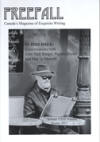Freefall – Winter 2013
Freefall bills itself as “Canada’s Magazine of Exquisite Writing.” Their mission statement commits to publishing 85% Canadian content, ranging from new and emerging to experienced writers. The editor’s opening statement, written by Micheline Maylor, describes an opposition to demolishing Al Purdy’s A-frame house, asking: “If muscle has the ability to remember, then why not a wall, a house, a landscape?” Her preamble continues, “For what is this life without a little magic?” and sets the tone for the creative work that follows.
Freefall bills itself as “Canada’s Magazine of Exquisite Writing.” Their mission statement commits to publishing 85% Canadian content, ranging from new and emerging to experienced writers. The editor’s opening statement, written by Micheline Maylor, describes an opposition to demolishing Al Purdy’s A-frame house, asking: “If muscle has the ability to remember, then why not a wall, a house, a landscape?” Her preamble continues, “For what is this life without a little magic?” and sets the tone for the creative work that follows.
Rebecca Rosenblum’s short story, “Anxiety Attack,” concerns a perplexed Doug, who is “not the best help”: “He always read the manual, always had a working pen and everyone’s current address, but only because he feared a world without such precautions.” For reasons Doug cannot completely fathom, he has been made the emergency contact for Jake, the young son of his friends. Doug responds to the call, leaving his office to pick up Jake at school because of a bomb threat. Doug’s uncertainty and his disconnection from his reactions to Jake drive the narrative to an unexpected place.
Rona Altrow’s two-page piece, “Mozart,” begins with a chatty sonographer asking Glenda to hum as she undergoes an ultrasound. The sonographer goes on and on about herself, insisting that she was the same technician who performed Glenda’s previous exam. Glenda denies this repeat occurrence, thinking, as the sonographer flittingly describes her new condo, “If she calls that apartment awesome, I may walk.” The next words from the sonographer are, “My condo’s totally awesome.” “Mozart” investigates the uncomfortable relationship between medical personnel and patients, the gap between sensitivity and practicality.
Lisa Bush’s poem, “Please Do Not . . .” takes the form of “a letter to my grade nine students before taking the Provincial Achievements Tests.” It both hilariously and plainly outlines a series of instructions for students to avoid when writing short stories and business letters on this test. Guidance includes: “Please do not have music montages / or make up languages of your own” and “Please do not sign your business letters with hearts.” The last line of the piece veers towards the less nonsensical and more personal, “If you follow the above recommendations / you will do well on the Provincial Achievement Tests / and I will not lost my job.”
Jennifer Juneau’s poem is directed at a “you” who was an “honoured guest” at the narrator’s wedding, although no other attendees knew they were lovers. The poem moves through the narrator’s complex attitude of loss, concluding:
You must have thought me a fool
to think I was in love with you
because I was marrying somebody else.
You must have thought me a fool
to have you as an honoured guest at my wedding.
The piece leaves out the details of the relationship, dwelling instead on the narrator’s ghosting perception of the lover’s perception of the narrator.
Freefall also contains interviews with Pamela Porter, Mar’ce Merrell, and John Wall Barger, as well as book reviews.
[www.freefallmagazine.ca]





